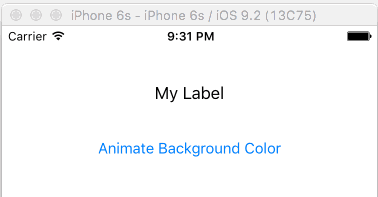UILabelの背景色をアニメーション化する方法は?
これは動作するように見えますが、動作しません。色が一度に緑色に変わります。
self.labelCorrection.backgroundColor = [UIColor whiteColor];
[UIView animateWithDuration:2.0 animations:^{
self.labelCorrection.backgroundColor = [UIColor greenColor];
}];
どこにも文書化されていませんが、コードがバニラbackgroundColorで正常に動作するため、UILabelのUIViewプロパティはアニメートできないようです。ただし、ラベルビュー自体の背景色を設定しない限り、このハックは機能しているように見えます。
#import <QuartzCore/QuartzCore.h>
...
theLabel.layer.backgroundColor = [UIColor whiteColor].CGColor;
[UIView animateWithDuration:2.0 animations:^{
theLabel.layer.backgroundColor = [UIColor greenColor].CGColor;
} completion:NULL];
Swift
(important)UILabelの背景色をクリアに設定します(IBまたはコードで)。例えば:
override func viewDidLoad() { super.viewDidLoad() myLabel.backgroundColor = UIColor.clear }レイヤーの背景色をアニメーション化します。
@IBAction func animateButtonTapped(sender: UIButton) { UIView.animate(withDuration: 1.0, animations: { self.myLabel.layer.backgroundColor = UIColor.red.cgColor }) }
CGColorの後にUIColorが追加されることに注意してください。
結果
Swift
ラベルの背景色を白から緑にアニメーション化するには、次のようにラベルを設定します。
self.labelCorrection.backgroundColor = UIColor.clear
self.labelCorrection.layer.backgroundColor = UIColor.white.cgColor
このようにアニメーション化します。
UIView.animate(withDuration: 2.0) {
self.labelCorrection.layer.backgroundColor = UIColor.green.cgColor
}
元の状態に戻り、再びアニメートできるようにするには、必ずアニメーションを削除してください。
self.labelCorrection.layer.backgroundColor = UIColor.white.cgColor
self.labelCorrection.layer.removeAllAnimations()
アニメーション化できますが、何らかの理由で最初に(プログラムで)clearColorに設定する必要がありました。それなしでは、アニメーションは機能しなかったか、表示されませんでした。
カスタムテーブルセルのUILabelの背景色をアニメーション化しています。 willDisplayCellメソッドのコードを次に示します。 cellForRowでアニメーションを設定しようとはしません。多くのレイアウトがテーブルによって調整されるためです。
- (void)tableView:(UITableView *)tableView willDisplayCell:(UITableViewCell *)cell forRowAtIndexPath:(NSIndexPath *)indexPath
{
((RouteListCell *)cell).name.backgroundColor = [UIColor clearColor];
[((RouteListCell *)cell).name backgroundGlowAnimationFromColor:[UIColor whiteColor] toColor:[UIColor redColor] clearAnimationsFirst:YES];
}
これが私のアニメーションルーチンです。
-(void) backgroundGlowAnimationFromColor:(UIColor *)startColor toColor:(UIColor *)destColor clearAnimationsFirst:(BOOL)reset;
{
if (reset)
{
[self.layer removeAllAnimations];
}
CABasicAnimation *anAnimation = [CABasicAnimation animationWithKeyPath:@"backgroundColor"];
anAnimation.duration = 1.00;
anAnimation.repeatCount = HUGE_VAL;
anAnimation.autoreverses = YES;
anAnimation.fromValue = (id) startColor.CGColor; // [NSNumber numberWithFloat:1.0];
anAnimation.toValue = (id) destColor.CGColor; //[NSNumber numberWithFloat:0.10];
[self.layer addAnimation:anAnimation forKey:@"backgroundColor"];
}
私は最近この問題に再び遭遇し、いくつかの調査の後、基本的に何も変わらないと考えたため(おそらく予見できる将来ではないだろう)、そのためにFacebook POPフレームワーク (だけでなく)を使用することになりました。
ビューとレイヤーの両方で基本プロパティのアニメーションを簡単に行うことができますが、さらに、色(および基本的には何でも、カスタムコードを含む追加のコーディングを含む)の間でスムーズに移行できます。そのため、背景色については、次のようにします。
// Create spring animation (there are more types, if you want)
let animation = POPSpringAnimation(propertyNamed: kPOPViewBackgroundColor)
// Configure it properly
animation.autoreverses = false
animation.removedOnCompletion = true
animation.fromValue = UIColor.yourBeginningColor()
animation.toValue = UIColor.yourFinalColor()
// Add new animation to your view - animation key can be whatever you like, serves as reference
label.pop_addAnimation(animation, forKey: "YourAnimationKey")
Viola、そのプロパティを持つすべての背景色をアニメーション化できるようになりました!
NSTimerまたはCADisplayLinkコールバックに基づいて、適切なフレームレート(20 fpsなど)で手動でカラーアニメーションを実行します。アニメーション全体の時間の経過時間(例では2.0秒)に基づいて、RGBまたはHSVで独自の色変化曲線を計算するか、40個の中間色の配列を使用する必要があります。
これを試してください、
[UIView transitionWithView:yourView duration:0.2 options:UIViewAnimationOptionTransitionNone animations:^{
[yourView setBackgroundColor:[UIColor colorWithRed:0.8588 green:0.8588 blue:0.8588 alpha:1]];
}completion:^(BOOL finished) {
}];
わたしにはできる。
Swift 4.1 UILabel Extension:
この拡張機能をコードに追加します。
extension UILabel {
/** Animates the background color of a UILabel to a new color. */
func animateBackgroundColor(to color : UIColor?, withDuration : TimeInterval, completion : ((Bool) -> Void)? = nil) {
guard let newColor = color else { return }
self.backgroundColor = .clear
UIView.animate(withDuration: withDuration, animations: {
self.layer.backgroundColor = newColor.cgColor
}, completion: completion)
}
}
次のように使用する必要があります。
myUILabel.animateBackgroundColor(to: .red, withDuration: 0.5)
元の色に戻したい場合は、次のように使用します。
// Storing the orignal color:
let originalColor = myUILabel.backgroundColor
// Changing the background color:
myUILabel.animateBackgroundColor(to: .red, withDuration: 0.5)
// ... Later:
// Restoring the original color:
myUILabel.animateBackgroundColor(to: originalColor, withDuration: 0.5, completion: {
(value: Bool) in
myUILabel.backgroundColor = originalColor
})
それは、ドキュメントでbackgroundColorがアニメート可能であると述べています
いつから本当に分からない。
Quartzに浸りたくない場合は、回答ごとに前の回答の1つで、UILabelと同じサイズの空のUIViewを作成し、UILabelと同じ場所に(そしてZオーダーでその下に)配置します。そのUIViewの背景色をアニメーション化します(私はこれを試しましたが、私にとってはうまくいきます)。
リファレンスは次のとおりです。
アニメーションビューにコミットする変更を含むブロックオブジェクト。これは、ビュー階層内のビューのアニメート可能なプロパティをプログラムで変更する場所です。このブロックにはパラメーターがなく、戻り値もありません。このパラメーターはNULLであってはなりません
これについて私が理解しているのは、あなたのビューがアニメーションブロックを呼び出し、それからあなたのビューラベルの背景色が緑にコミットされるときです。次に、ラベルの背景色を他の色に変更しない場合、常に緑色になります。これは私が推測するものです
